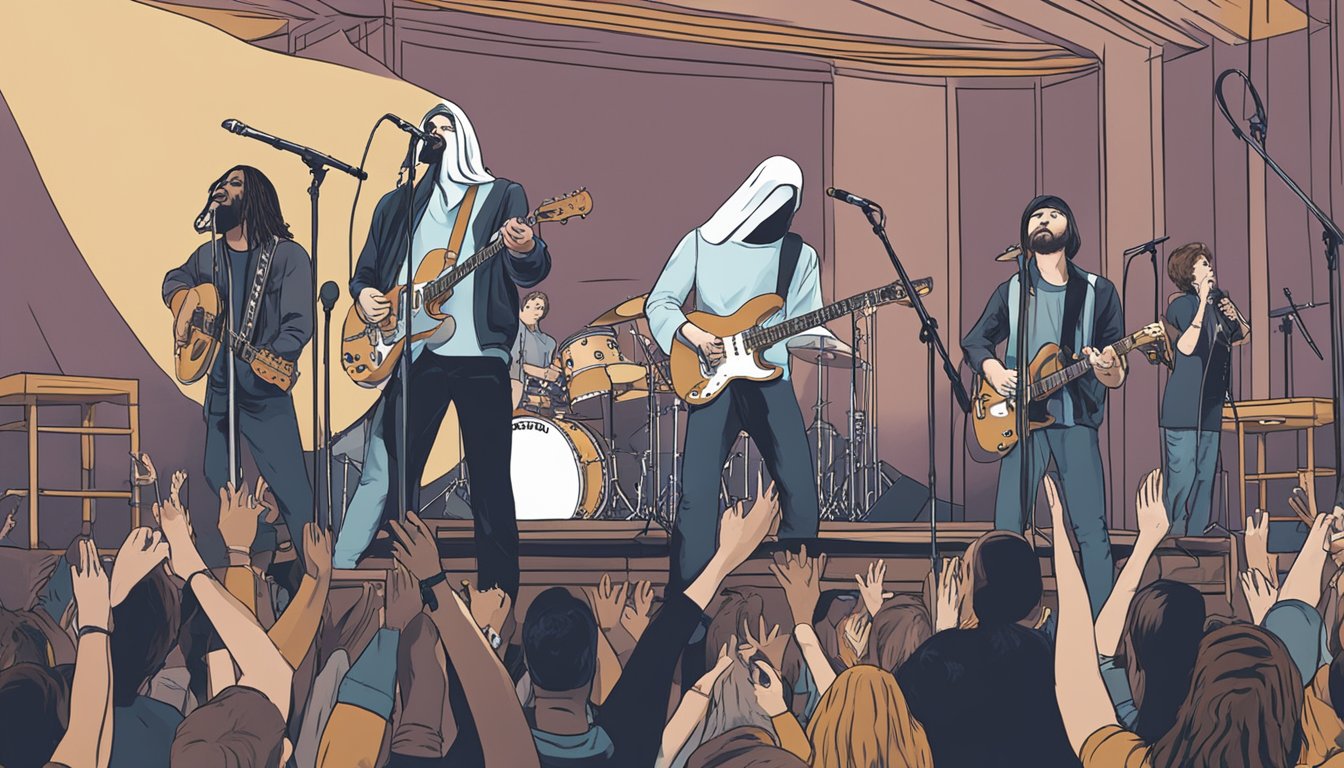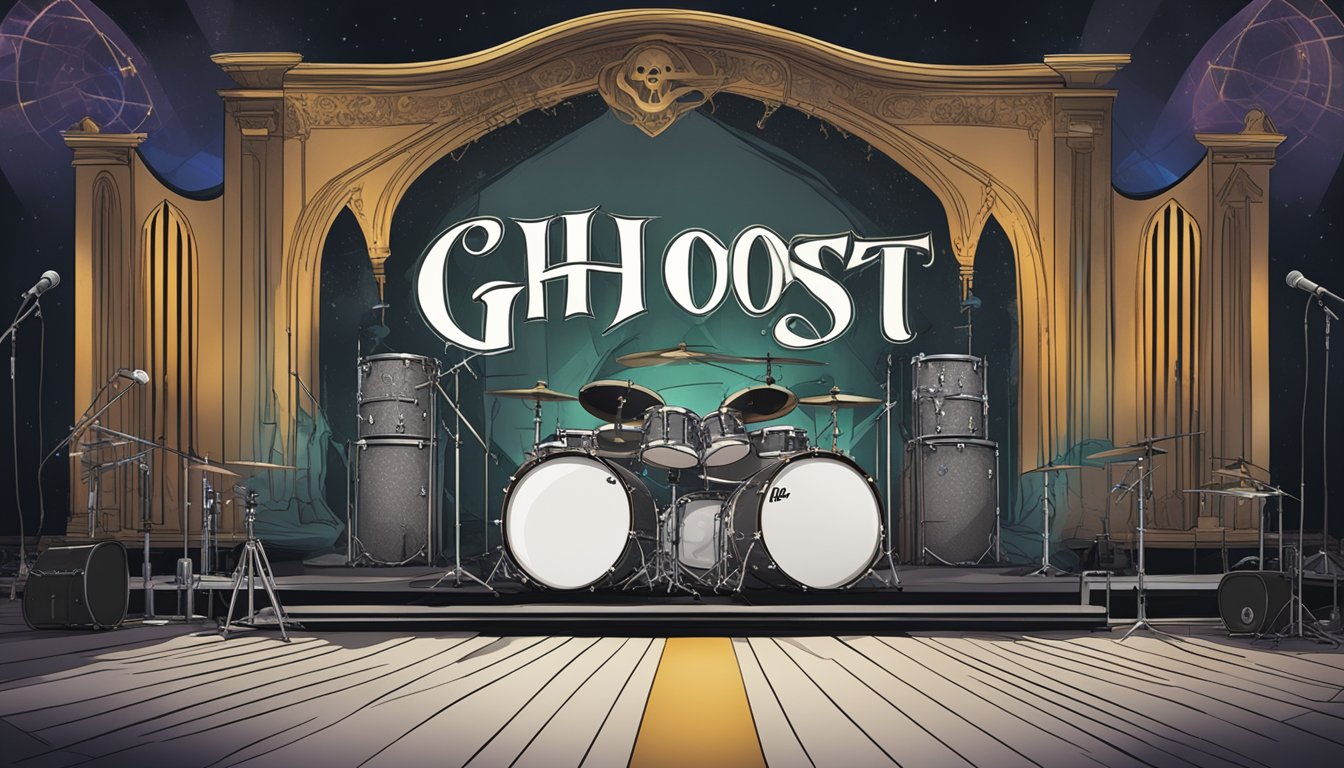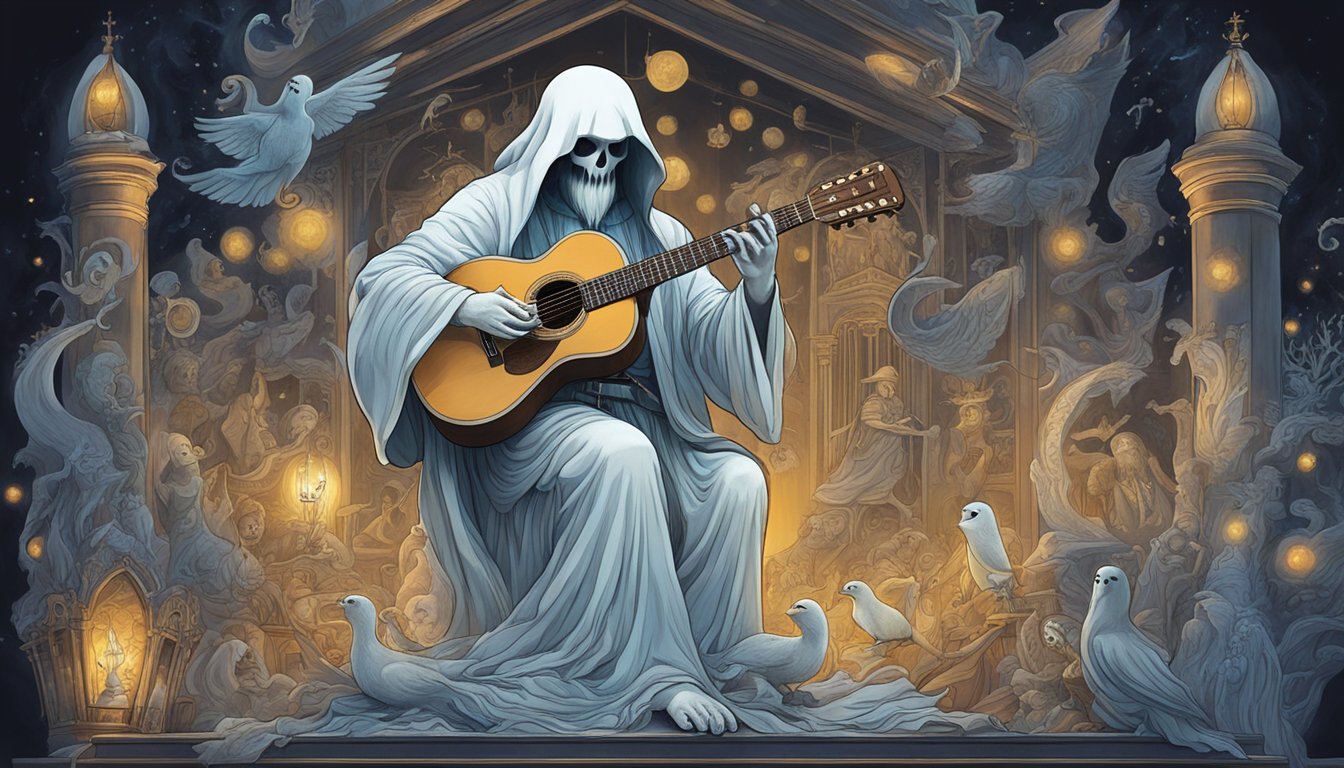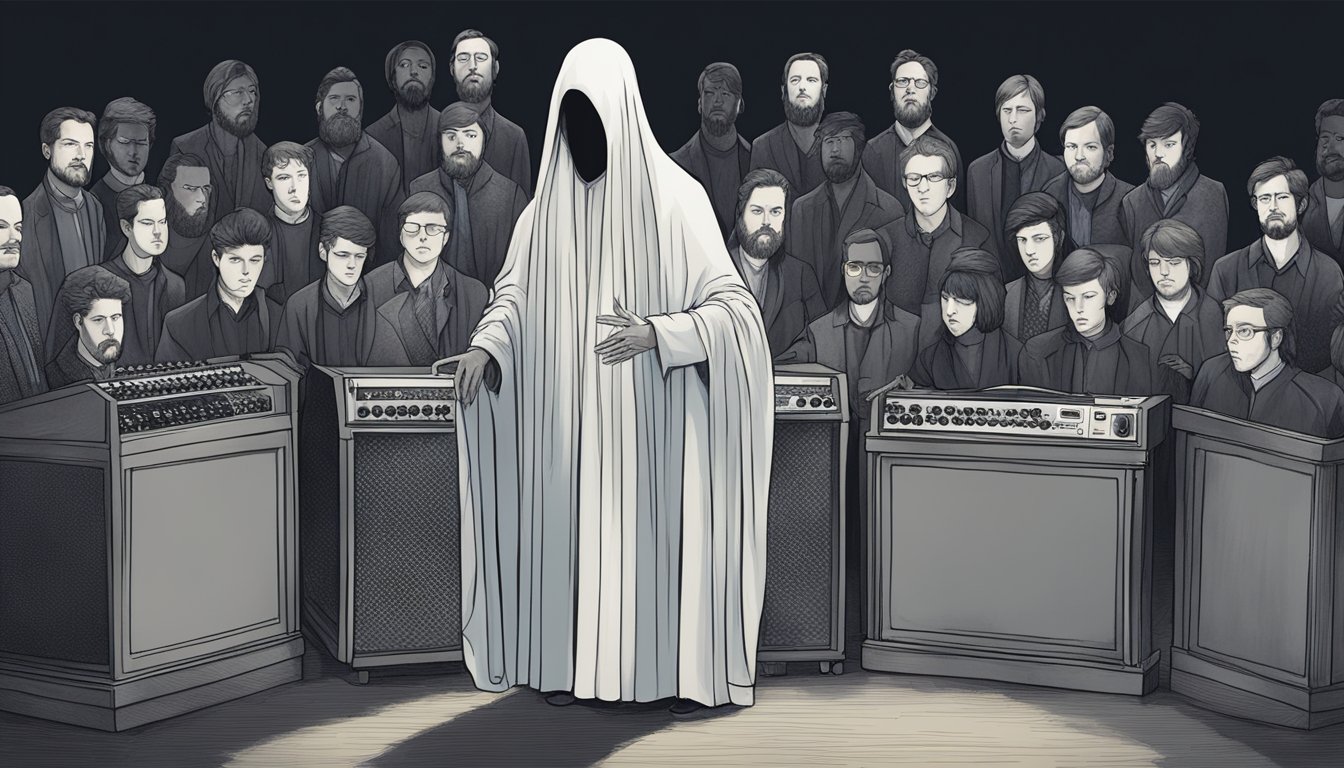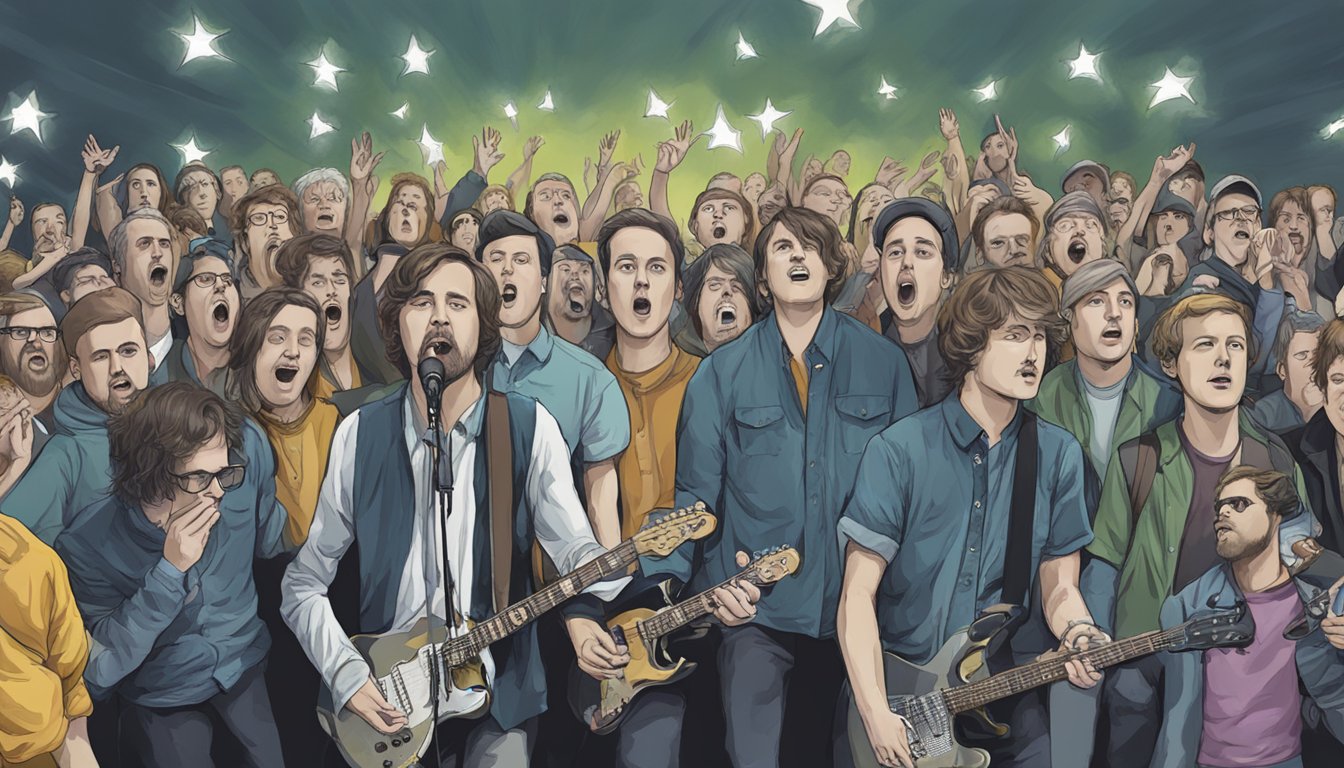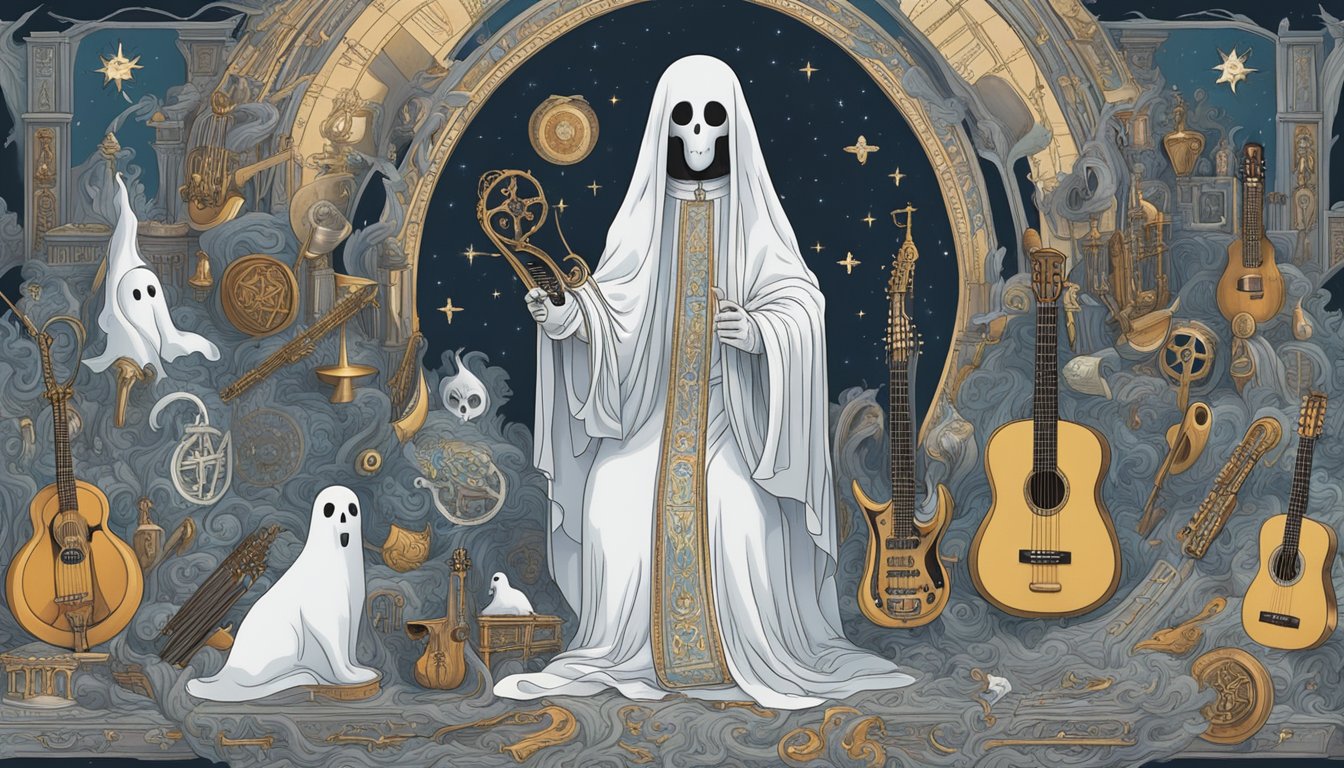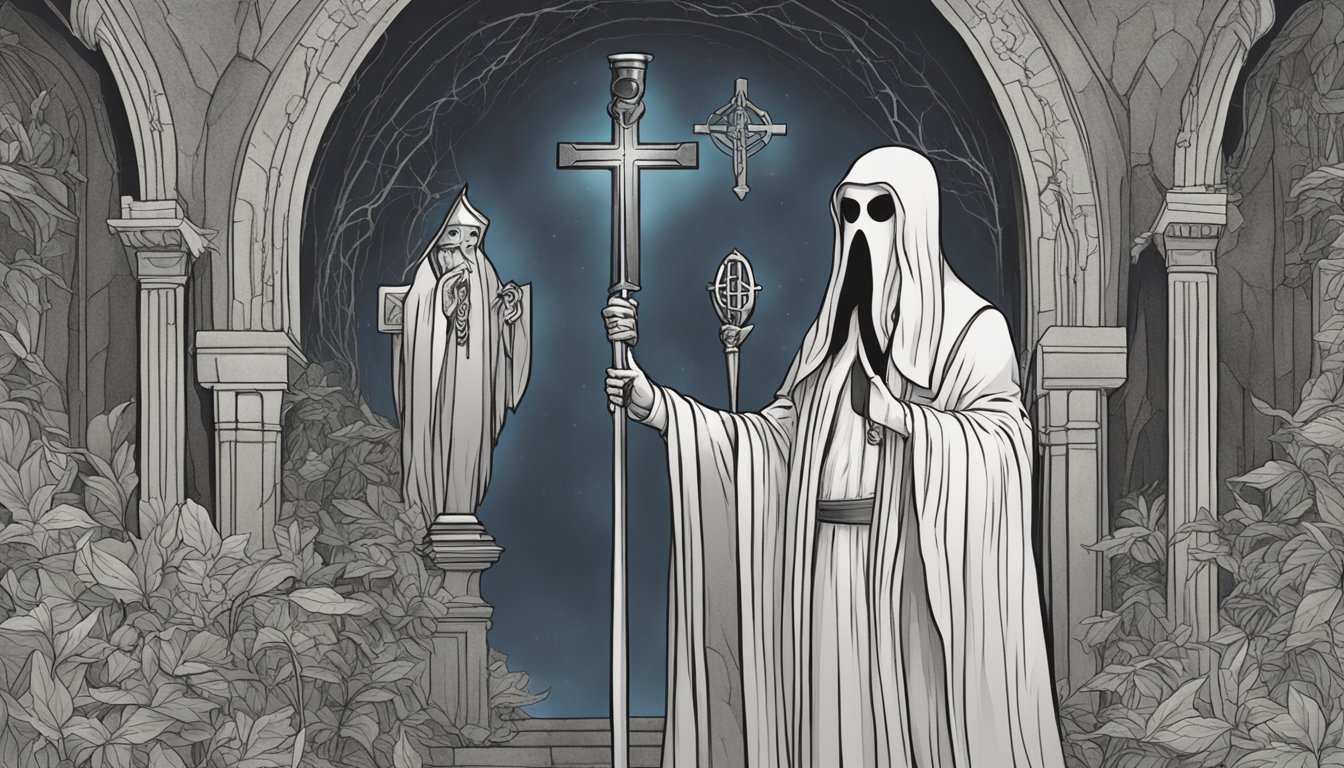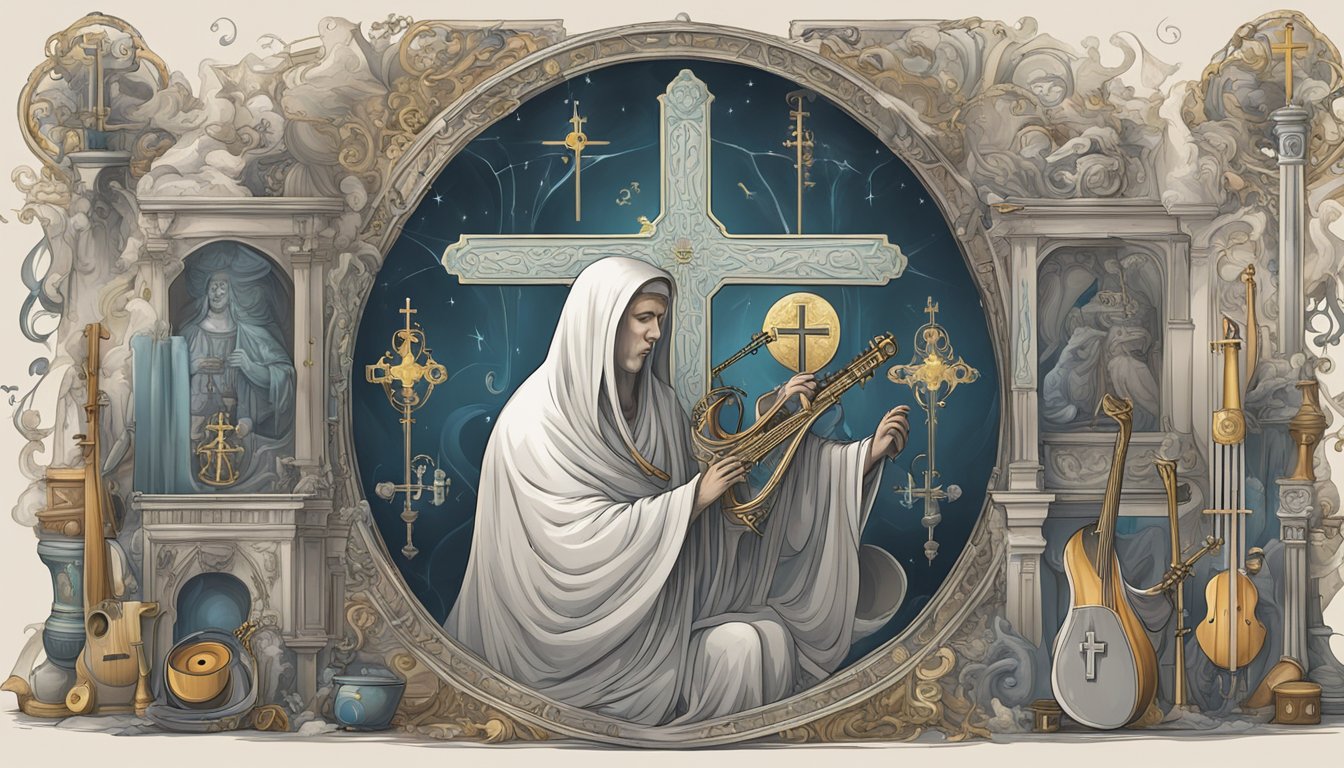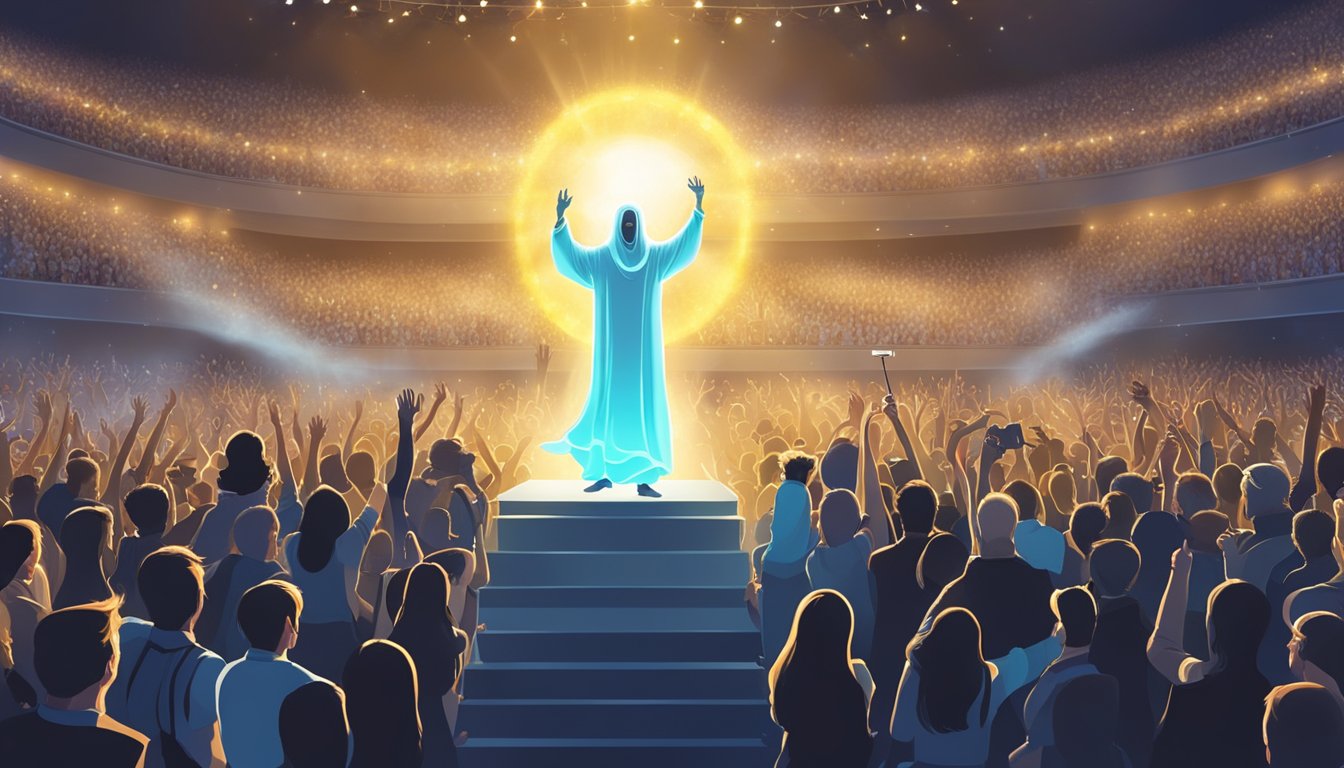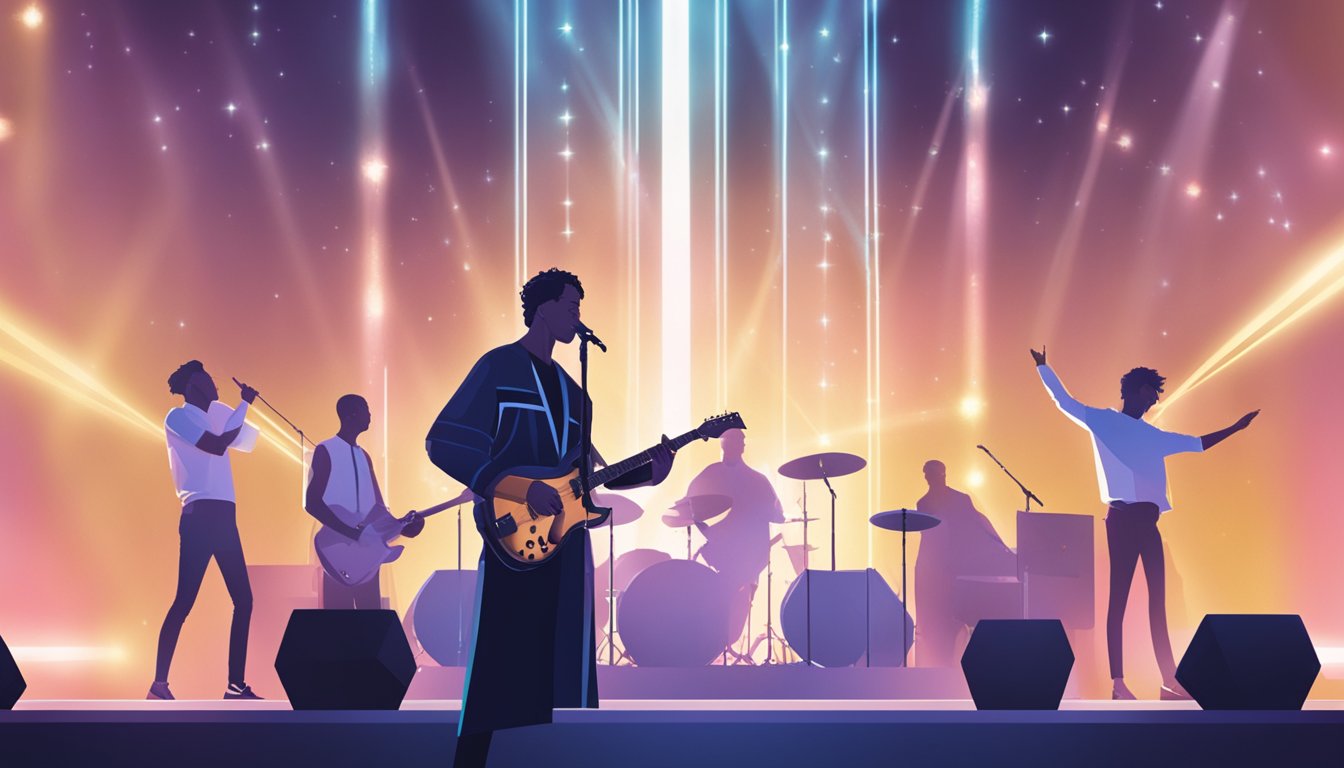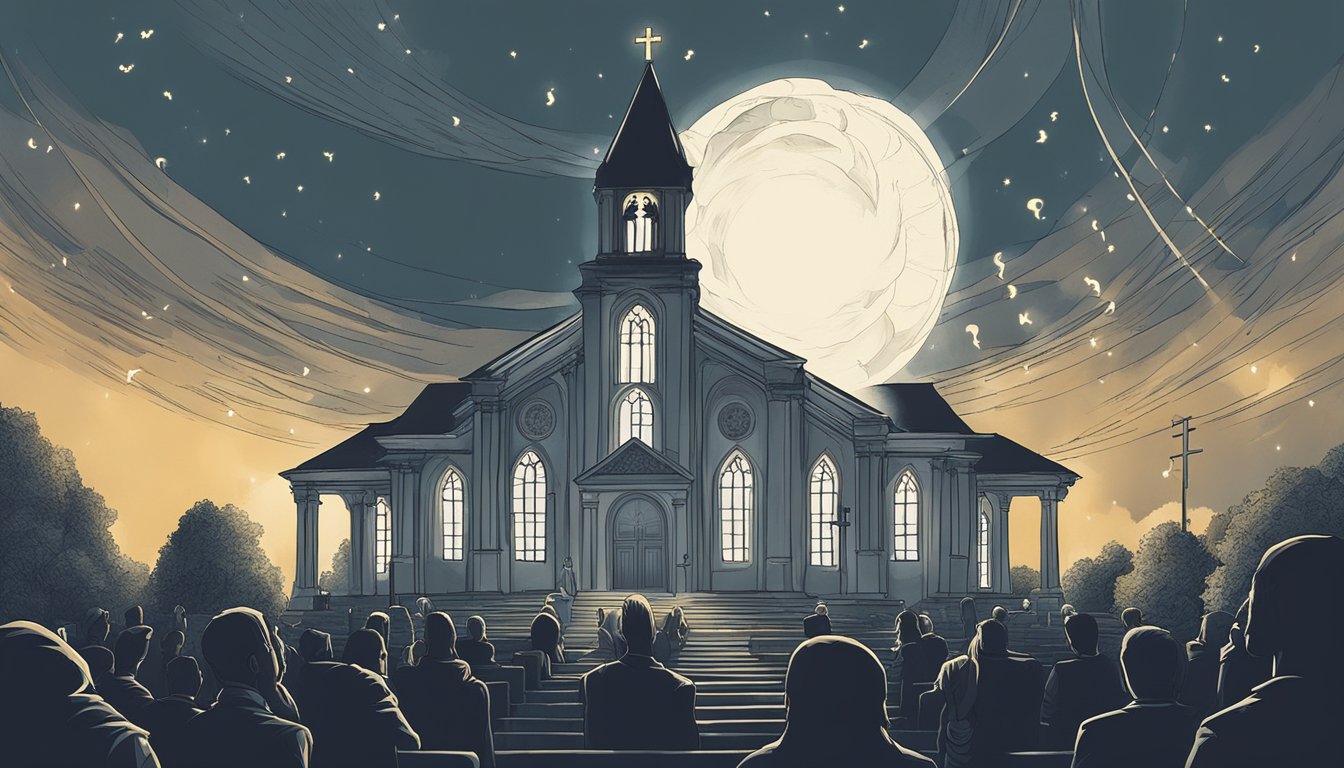Ghost is a Swedish rock band known for their unique sound and controversial imagery and themes. The band, whose members conceal their identities with masks and costumes, has sparked debate about their religious affiliation. Some fans and critics have labeled them as a satanic or anti-Christian band, while others argue that their music contains Christian elements.
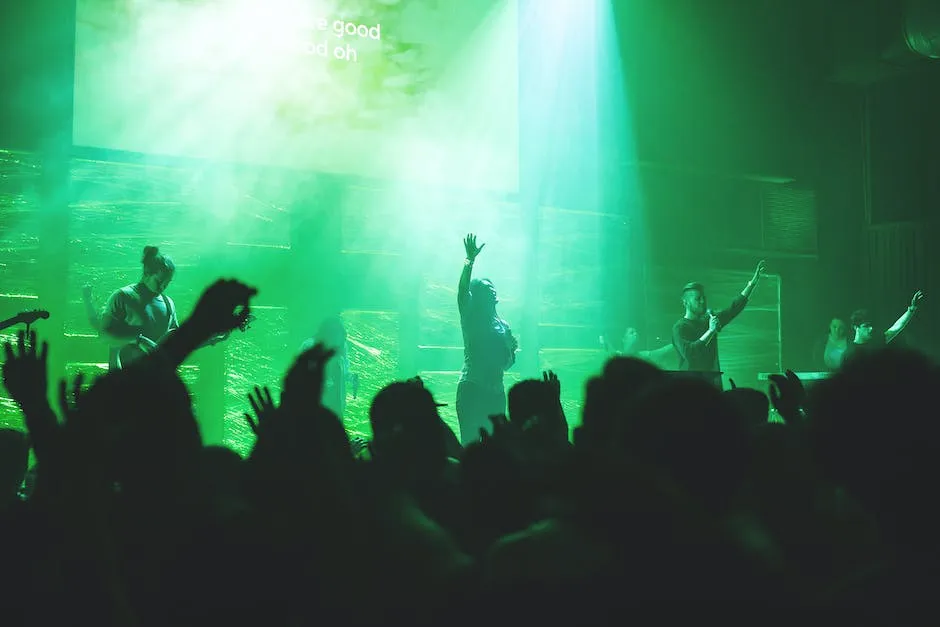
Background of Ghost:
The band was formed in 2006 and released their debut album, Opus Eponymous, in 2010. Their music is often described as a blend of heavy metal, hard rock, and pop music. Ghost’s theatrical live shows, which feature elaborate stage sets and costumes, have earned them a reputation as one of the most visually stunning bands in the world.
Imagery and Themes:
Ghost’s music and imagery are heavily influenced by horror movies, gothic literature, and religious iconography. The band’s lyrics often explore themes of death, Satanism, and the occult. However, some fans and critics have argued that the band’s use of religious imagery is not meant to be taken seriously and is instead a form of satire or parody.
Key Takeaways
- Ghost is a Swedish rock band known for their unique sound and controversial imagery and themes.
- The band’s music and imagery are heavily influenced by horror movies, gothic literature, and religious iconography.
- Debate about their religious affiliation continues, with some fans and critics labeling them as a satanic or anti-Christian band, while others argue that their music contains Christian elements.
Background of Ghost

Formation and Members
Ghost is a Swedish rock band that was formed in 2006 by Tobias Forge. The band started as a small project, but it quickly gained popularity, and since then, it has become one of the most successful rock bands in Sweden. Tobias Forge is the lead vocalist and songwriter of the band. He is also known by his stage name Papa Emeritus and Cardinal Copia.
Ghost has had several members over the years, but the identities of the band members have always been kept secret. The band members are known as Nameless Ghouls, and they wear masks and costumes during their performances. The anonymity of the band members has been a part of the band’s image and has added to the mystery surrounding the band.
Musical Style and Influences
Ghost’s musical style is a blend of rock, metal, and pop. The band’s songs have a dark and theatrical sound, and the lyrics often deal with themes of death, Satanism, and the occult. The band’s music has been influenced by classic rock bands like Black Sabbath and Blue Öyster Cult, as well as newer metal bands like Mastodon and Opeth.
Ghost has released several albums, including “Opus Eponymous,” “Infestissumam,” and “Meliora.” The band’s music has been well-received by both fans and critics, and the band has won several awards for their music.
In conclusion, Ghost is a Swedish rock band that was formed in 2006 by Tobias Forge. The band’s musical style is a blend of rock, metal, and pop, and the band’s lyrics often deal with themes of death, Satanism, and the occult. The anonymity of the band members has been a part of the band’s image and has added to the mystery surrounding the band.
Imagery and Themes
Stage Presence and Aesthetics
Ghost is known for their theatrical and visually stunning live performances. The band members, who are always clad in elaborate costumes, are known for their dark and mysterious stage presence. Their shows are often accompanied by intricate lighting and visual effects, which add to the overall atmosphere of their performances. The band’s use of religious imagery, such as crosses and inverted crosses, as well as satanic imagery, such as pentagrams and demons, adds to the dark and ominous feel of their shows.
Lyrical Content and Symbolism
Ghost’s lyrics often explore themes of the occult, satanism, and anti-Christianity. Their songs often contain references to the devil, hell, and other satanic themes. However, the band’s approach to these themes is more satirical and theatrical rather than promoting any specific religious belief. They use religious imagery and symbolism to create a dark and ominous atmosphere, rather than to promote a specific religious ideology. Ghost’s use of religious imagery and symbolism is more akin to a horror movie than a religious sermon.
In conclusion, Ghost’s imagery and themes are heavily influenced by religious and satanic themes, but their approach is more theatrical and satirical than promoting any specific religious belief. The band’s use of religious imagery, satanic imagery, and theatrical costumes and visuals add to the overall atmosphere of their performances.
Debate on Religious Affiliation

https://www.youtube.com/watch?v=IJScARPQIDo&embed=true
Christian Band Accusations
There has been a lot of debate on whether Ghost is a Christian band. Some people accuse the band of being Satanic and anti-Christian due to their use of religious imagery and themes in their music and performances. However, others argue that the band’s approach is more satirical and theatrical rather than promoting any specific religious belief.
It is true that Ghost’s lyrics often reference Satanism, anti-Christianity, and the occult. For example, the song “Year Zero” includes the lyrics “Belial, Behemoth, Beelzebub, Asmodeus, Satanas, Lucifer”. However, the band has stated that their use of these themes is not meant to be taken seriously and is instead a way to create a theatrical and entertaining performance for their fans.
Band’s Stance on Religion
Despite the accusations of being Satanic, the band’s frontman, Tobias Forge, has stated that he does not consider himself a Satanist or a member of any specific religion. In an interview with Loudwire, Forge stated that he is interested in the history and mythology of different religions and that he uses these themes in his music to create a story.
Furthermore, in an interview with Kerrang!, Forge stated that he believes that religion can be a positive force in people’s lives but that it can also be used to justify terrible acts. He also stated that he does not believe in an afterlife and that he thinks people should focus on living a good life in the present rather than worrying about what happens after they die.
In conclusion, while Ghost’s music does include references to Satanism, anti-Christianity, and the occult, the band’s stance on religion is more complex than simply being a Christian or Satanic band. The band’s use of these themes is meant to create a theatrical and entertaining performance rather than promoting any specific religious belief.
Album Analysis
« Is Baptist a Christian? Exploring the Relationship Between Baptist Beliefs and Christianity
Is the UK a Christian Country? Exploring the Role of Christianity in Contemporary British Society »
Opus Eponymous and Religious Undertones
Ghost’s debut album, Opus Eponymous, was released in 2010. The album features religious undertones, with lyrics that reference Satanism, Lucifer, and the Antichrist. Despite this, the album’s sound is heavily influenced by classic rock and metal, with catchy riffs and melodic vocals.
One of the standout tracks on Opus Eponymous is “Ritual,” which features lyrics about a Satanic ceremony. The song’s chorus includes the lines “This chapel of ritual / Smells of dead human sacrifices / From the altar.” The song’s concept is reminiscent of classic horror movies and adds to the album’s overall dark and mysterious tone.
Prequelle and Thematic Elements
Ghost’s fourth album, Prequelle, was released in 2018. The album features a concept centered around death and the plague. Despite this, the album also features themes of salvation and redemption, with lyrics that reference God and the afterlife.

One of the standout tracks on Prequelle is “Dance Macabre,” which features a catchy, upbeat melody and lyrics about dancing with death. The song’s chorus includes the lines “Just wanna be / Wanna bewitch you in the moonlight / Just wanna be / I wanna bewitch you all night.” The song’s catchy melody and upbeat tone contrast with the album’s overall theme of death and the afterlife.
Overall, Ghost’s albums feature a mix of religious and thematic elements, with lyrics that reference Satanism, death, and salvation. The band’s sound is heavily influenced by classic rock and metal, with catchy riffs and melodic vocals.
Public Perception and Media
Reception by Christian Groups
Ghost’s music and image have been the subject of controversy within the Christian community. Some Christian groups have accused the band of promoting Satanism and anti-Christianity. In fact, a Christian group prayed outside one of the band’s gigs in Texas, accusing Ghost of “bringing glory to Satan” Independent.co.uk.
However, not all Christians view Ghost’s music in a negative light. Some appreciate the band’s theatrical and satirical approach to religious themes. Ghost’s frontman, Tobias Forge, has stated in interviews that he was raised in a Christian family and still considers himself a spiritual person Christianforums.com.
Mainstream Media Interpretation

Ghost’s image and music have been widely interpreted by mainstream media outlets as a satanic band. The band’s lyrics often reference Satanism, anti-Christianity, and the occult. Despite this, Ghost has been recognized by the music industry, receiving a Grammy for Best Metal Performance in 2016 Faithbase.church.
Ghost’s social media presence has also contributed to their public perception. The band’s official Twitter account often posts humorous and irreverent content, further blurring the lines between their satirical image and their actual beliefs Christianeducatorsacademy.com.
Overall, Ghost’s image and music have been interpreted in a variety of ways by different groups. While some Christians view the band as promoting Satanism, others appreciate their theatrical approach to religious themes. Mainstream media outlets often describe Ghost as a satanic band, but the band’s social media presence adds a layer of humor and irreverence to their public image.
Ghost’s Discography
Evolution of Sound
Ghost is a Swedish metal band that has been active since 2006. The band’s sound has evolved over the years, starting with a more traditional heavy metal sound and gradually incorporating more hard rock and pop elements into their music. Their earlier albums, such as “Opus Eponymous” and “Infestissumam,” are characterized by their dark, occult-inspired lyrics and heavy use of organ and choir sounds.

As the band’s sound evolved, they began to incorporate more pop and dance elements into their music. This can be heard on their 2015 album “Meliora,” which features the hit single “Cirice.” The song won a Grammy Award for Best Metal Performance in 2016. The band’s 2018 album “Prequelle” continued this trend, with the hit singles “Rats” and “Dance Macabre.”
Notable Albums and Hits
Ghost has released a total of five studio albums to date. Their debut album, “Opus Eponymous,” was released in 2010 and features the songs “Elizabeth” and “Stand by Him.” The album was well-received by critics and helped establish the band’s sound and style.
Their follow-up album, “Infestissumam,” was released in 2013 and features the songs “Year Zero” and “Secular Haze.” The album continued the band’s trend of incorporating religious and occult themes into their music.
In 2015, the band released “Meliora,” which features the hit single “Cirice.” The album was a commercial and critical success, earning the band a Grammy Award. The album also features the songs “From the Pinnacle to the Pit” and “Majesty.”
In 2018, Ghost released “Prequelle,” which features the hit singles “Rats” and “Dance Macabre.” The album continues the band’s trend of incorporating pop and dance elements into their music, while still maintaining their heavy metal roots. The album also features the songs “Faith” and “Life Eternal.”

Overall, Ghost’s discography showcases the band’s evolution from a traditional heavy metal sound to a more pop and dance-inspired sound. The band’s use of religious and occult themes in their lyrics has remained a constant throughout their career, and their music continues to be well-received by both fans and critics alike.
Cultural Impact
Ghost, the Swedish rock band, has made a significant impact on the metal scene since its inception in 2006. The band’s unique sound, controversial image, and cryptic lyrics have contributed to its popularity among fans of heavy metal music.
Influence on the Metal Scene
Ghost’s theatrical performances and satanic imagery have drawn comparisons to bands like Kiss, who were known for their elaborate stage shows and flamboyant costumes in the 70s and 80s. However, Ghost’s music and image have also been associated with gothic and doom metal, which are known for their dark and melancholic themes.
Ghost’s music has also influenced other bands in the metal scene. For example, the band’s use of melodic vocals and catchy hooks has been emulated by several other bands in the genre. Ghost’s fusion of different genres, including metal, pop, and classical music, has contributed to the rise of genre crossovers in the metal scene.
Contribution to Genre Crossovers

Ghost’s music has been described as a fusion of different genres, including metal, pop, and classical music. This has contributed to the rise of genre crossovers in the metal scene, as other bands have followed Ghost’s lead in blending different styles of music.
Ghost’s use of melodic vocals and catchy hooks has also influenced the rap and hip-hop scenes. For example, the band’s hit song “Square Hammer” was sampled by rapper Lil Uzi Vert in his song “XO TOUR Llif3.”
Overall, Ghost’s impact on the metal scene and beyond cannot be overstated. The band’s unique sound, controversial image, and cryptic lyrics have contributed to its popularity among fans of heavy metal music and beyond.
Controversies and Criticisms
https://www.youtube.com/watch?v=KcQGbA6PMCk&embed=true
Allegations of Satanism
Ghost has faced numerous allegations of satanism since their inception. The band’s use of satanic imagery and lyrics has led some to believe that they are promoting satanism. Some fans have even accused the band of being a satanic cult.

However, these allegations are not supported by the band’s members themselves. In an interview with Yahoo, Tobias Forge, the lead singer and songwriter of Ghost, stated that the band’s use of satanic imagery is purely for artistic purposes and not meant to promote any particular ideology. He also stated that the band is not affiliated with any religious or political groups.
Responses to Accusations
Ghost has responded to accusations of satanism in a number of ways. The band has stated that their use of satanic imagery is meant to be ironic and that they are not promoting any particular ideology. They have also stated that they do not consider themselves to be a satanic band.
In addition, the band has emphasized that their music is not meant to be taken too seriously. They have stated that their lyrics are often tongue-in-cheek and that they do not take themselves too seriously as a band.
Despite these responses, some fans and critics continue to accuse Ghost of promoting satanism. However, the band has remained steadfast in their position that their music is meant to be enjoyed for its artistic value and not as a promotion of any particular ideology.
Band’s Unique Identity

Ghost is a Swedish rock band known for their unique identity, which includes anonymity, characters, theatrics, and performances. The band’s identity has been a topic of discussion among fans and critics alike, with many wondering about the meaning behind their elaborate stage shows and costumes.
Anonymity and Characters
One of the most distinctive aspects of Ghost is their anonymity. The band members are known as “Nameless Ghouls” and wear identical masks and robes during performances. The lead singer, who goes by the name “Papa Emeritus” or “Cardinal Copia,” wears a papal outfit and skull makeup.
The band’s anonymity adds to their mystique and allows them to maintain a sense of privacy. It also serves to emphasize the importance of the music and the message they are trying to convey, rather than the individual members themselves.
Theatrics and Performances
Ghost’s live shows are known for their elaborate theatrics and performances. The band incorporates elements of horror and the occult into their stage shows, with props such as a giant inverted cross, a throne made of bones, and a demonic statue of the band’s mascot, “Nihil.”
The band’s theatrical performances are meant to enhance the music and create a unique experience for the audience. They have been compared to a combination of a rock concert and a Broadway show, with the band members playing their roles as characters in a larger narrative.

Overall, Ghost’s unique identity sets them apart from other rock bands and has contributed to their success. Their anonymity, characters, theatrics, and performances all work together to create a cohesive and memorable experience for fans.
Marketing and Promotion
Ghost is a band that has gained a lot of attention due to their unique and controversial image. The band’s marketing and promotion strategies have played a significant role in their success. In this section, we will discuss how Ghost’s use of visuals and artwork, as well as their engagement with fans, has contributed to their popularity.
Role of Visuals and Artwork
Ghost’s use of visuals and artwork is one of the band’s key marketing strategies. The band’s cover art, stage performances, and face paint all contribute to their distinctive image. The band’s artwork often features satanic imagery and occult themes, which has led some to question whether Ghost is a Christian band or not.
However, the band’s use of these themes is often done with a sense of humor and satire. The band’s frontman, Tobias Forge, has stated in interviews that the band’s use of satanic imagery is not meant to be taken seriously. Instead, it is meant to be a form of entertainment for their fans.
Engagement with Fans
Ghost’s engagement with their fans is another important aspect of their marketing strategy. The band is known for being very interactive with their fans, both online and in person. They frequently hold meet-and-greets and other fan events, which has helped to build a strong fan community around the band.
In addition, the band’s tours are often highly theatrical and entertaining, with elaborate stage setups and costumes. This has helped to create a memorable experience for fans who attend their shows.
Overall, Ghost’s marketing and promotion strategies have been successful in creating a unique and memorable image for the band. While their use of satanic imagery and occult themes may be controversial, it is done in a way that is meant to be entertaining and humorous for their fans.
Future Directions
Upcoming Projects and Tours
As of December 2023, Ghost has not announced any upcoming projects or tours. However, the band has a history of releasing new albums every couple of years, so fans can expect to hear new music from them in the near future.
Ghost’s last album, Impera, was released in 2021. The album received critical acclaim and showcased the band’s unique blend of metal and rock music. Fans can anticipate that the band’s next album will continue to explore themes of religion, the occult, and the supernatural.
Potential Musical Shifts
Over the years, Ghost has experimented with different musical styles and genres. While the band is primarily known for its heavy metal and hard rock sound, they have also incorporated elements of pop, disco, and electronic music into their songs.
It is possible that Ghost may continue to explore different musical directions in the future. The band has always been known for its theatrical performances, so fans can expect that any new music will be accompanied by a visually stunning stage show.
Overall, Ghost’s future direction is uncertain, but fans can rest assured that the band will continue to create music that is both thought-provoking and entertaining.
Frequently Asked Questions
What are the beliefs and religious affiliations of Ghost band members?
The members of Ghost band have not publicly disclosed their religious affiliations or beliefs. However, they have stated in interviews that they do not identify as Satanists and that their use of Satanic imagery and themes is purely for theatrical purposes.
Can you explain the symbolism behind Ghost’s band logo?
The Ghost band logo features an inverted crucifix with a skull and crossbones. The inverted crucifix is a symbol commonly associated with Satanism, while the skull and crossbones represent death. The logo is meant to be provocative and controversial, in line with the band’s overall aesthetic.
Are the lyrics of Ghost band’s songs influenced by Christian themes?
Yes, the lyrics of Ghost band’s songs often contain references to Christian themes and imagery, such as in their song “He Is.” However, the band’s use of these themes is often satirical and ironic, and should not be taken as a serious endorsement of any particular religious belief.
How does Ghost band incorporate religious imagery into their performances?
Ghost band’s live performances often feature elaborate costumes and stage design, including the use of religious imagery such as crosses and stained glass windows. These elements are meant to create a theatrical and immersive experience for the audience.
What is the general perception of Ghost band in Christian communities?
The perception of Ghost band in Christian communities is mixed. Some Christians view the band as blasphemous and offensive, while others appreciate the band’s use of religious imagery as a way to spark discussion and challenge traditional beliefs.
What do fans of Ghost band typically call themselves?
Fans of Ghost band often refer to themselves as “Nameless Ghouls,” in reference to the band’s anonymous and mysterious stage personas.

